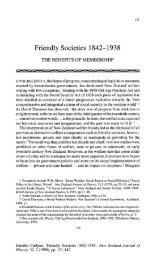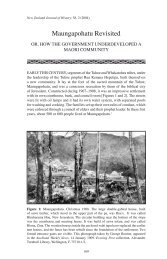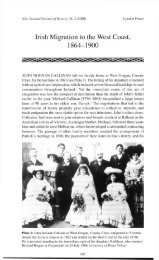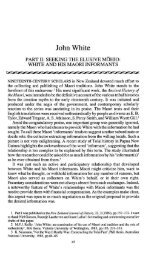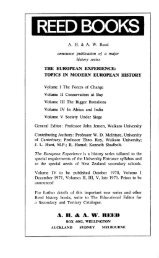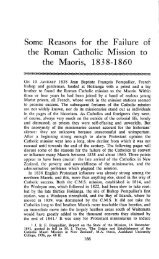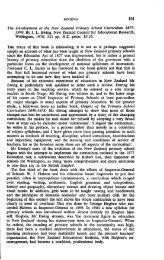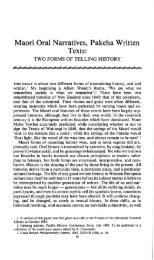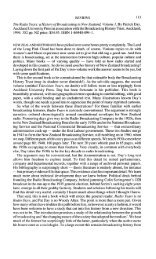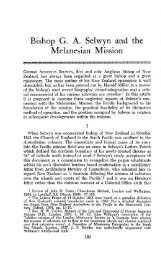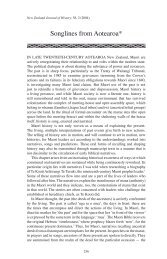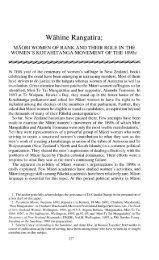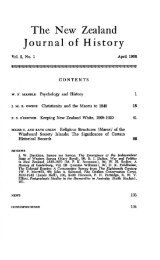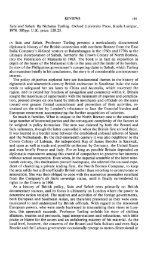New Zealand and the Mau in Samoa - New Zealand Journal of History
New Zealand and the Mau in Samoa - New Zealand Journal of History
New Zealand and the Mau in Samoa - New Zealand Journal of History
Create successful ePaper yourself
Turn your PDF publications into a flip-book with our unique Google optimized e-Paper software.
NEW ZEALAND AND THE MAU 93<br />
Throughout <strong>the</strong> period <strong>of</strong> its contact with Europeans, attempts to stabilize<br />
<strong>Samoa</strong>n politics had foundered on <strong>the</strong> same shoal: that <strong>Samoa</strong>n politics was a<br />
never-resolved contest between a victorious party <strong>and</strong> a vanquished one. As<br />
<strong>in</strong> Westm<strong>in</strong>ster electoral politics, <strong>the</strong>re was always a strong party (<strong>the</strong> malo),<br />
which enjoyed status <strong>and</strong> power, <strong>and</strong> a weak party (<strong>the</strong> vaivai), which was<br />
humiliated, powerless <strong>and</strong> resentful. The membership <strong>of</strong> both groups was<br />
fluid, <strong>and</strong> <strong>the</strong> vaivai conspired constantly to overthrow <strong>the</strong> malo, to become,<br />
<strong>in</strong> <strong>the</strong>ir turn, <strong>the</strong> malo. All attempts to establish unitary, stable governments<br />
between 1866 <strong>and</strong> 1899 had come to grief <strong>in</strong> civil war as <strong>the</strong> weak party<br />
sought to overthrow <strong>the</strong> strong. 1 Fluid though <strong>the</strong> political group<strong>in</strong>gs were, <strong>the</strong><br />
major titles <strong>of</strong> rank were affiliated with one or o<strong>the</strong>r <strong>of</strong> two sets <strong>of</strong> orator titles<br />
called Tumua <strong>and</strong> Pule respectively. The orators were <strong>the</strong> real power <strong>in</strong><br />
<strong>Samoa</strong>: <strong>the</strong>y were <strong>the</strong> ones who negotiated, exhorted, <strong>and</strong> made deals; it was<br />
<strong>the</strong>y, ra<strong>the</strong>r than <strong>the</strong> holders <strong>of</strong> <strong>the</strong> titles <strong>of</strong> rank, who possessed <strong>the</strong> <strong>in</strong>timate<br />
knowledge <strong>of</strong> history <strong>and</strong> genealogy which allowed <strong>the</strong>m to manipulate<br />
claims for titles <strong>and</strong> who could arrange alliances. Fundamentally, it was <strong>the</strong><br />
unwill<strong>in</strong>gness <strong>of</strong> <strong>the</strong> orator-chiefs to surrender <strong>the</strong>ir powers which made <strong>the</strong><br />
n<strong>in</strong>eteenth-century experiments <strong>in</strong> government unworkable.<br />
Likewise, <strong>the</strong> orator groups <strong>of</strong> Tumua <strong>and</strong> Pule were <strong>the</strong> ma<strong>in</strong> obstacles to<br />
<strong>the</strong> consolidation <strong>of</strong> power by <strong>the</strong> German colonial regime between 1900 <strong>and</strong><br />
1914. Governor Wilhelm Solf recognized that <strong>the</strong> modernization <strong>of</strong> <strong>Samoa</strong><br />
depended on break<strong>in</strong>g <strong>the</strong> power <strong>of</strong> Tumua <strong>and</strong> Pule, <strong>and</strong> similarly, Tumua or<br />
Pule were beh<strong>in</strong>d each <strong>of</strong> <strong>the</strong> <strong>Samoa</strong>n attempts to throw <strong>of</strong>f German power. 2<br />
The power <strong>of</strong> Tumua <strong>and</strong> Pule was, however, only suppressed, not broken, by<br />
<strong>the</strong> German regime. Until it could be broken, or sublimated <strong>in</strong> a form <strong>of</strong><br />
democratic party politics, <strong>the</strong> modernization <strong>of</strong> <strong>Samoa</strong>n politics could never<br />
happen. Leav<strong>in</strong>g aside for <strong>the</strong> moment <strong>the</strong> question <strong>of</strong> whe<strong>the</strong>r <strong>New</strong> <strong>Zeal<strong>and</strong></strong><br />
could have broken or did break <strong>the</strong> power <strong>of</strong> <strong>the</strong> orator groups, <strong>the</strong><br />
achievement <strong>of</strong> <strong>the</strong> <strong>Mau</strong> was to transcend <strong>the</strong>m. Under foreign government<br />
almost all chiefs, whe<strong>the</strong>r orators or not, became vaivai <strong>in</strong>s<strong>of</strong>ar as <strong>the</strong>y were<br />
made subord<strong>in</strong>ate. Hence, whatever else it failed to achieve, <strong>the</strong> <strong>Mau</strong> drew<br />
<strong>the</strong>m all toge<strong>the</strong>r, so that when, after <strong>the</strong> Second World War, <strong>New</strong> <strong>Zeal<strong>and</strong></strong><br />
placed decolonization on <strong>the</strong> political agenda, <strong>the</strong> cont<strong>in</strong>u<strong>in</strong>g rivalry <strong>of</strong> Tumua<br />
<strong>and</strong> Pule was not <strong>the</strong>re to hijack <strong>the</strong> process or underm<strong>in</strong>e <strong>the</strong> viability <strong>of</strong><br />
post-<strong>in</strong>dependence government.<br />
Most attempts to expla<strong>in</strong> <strong>the</strong> orig<strong>in</strong> <strong>of</strong> <strong>the</strong> <strong>Mau</strong> overlook <strong>the</strong> implications<br />
<strong>of</strong> <strong>the</strong> malo-vaivai division, <strong>and</strong> <strong>the</strong> rivalries <strong>of</strong> <strong>the</strong> orator-chiefs <strong>of</strong> Tumua<br />
<strong>and</strong> Pule. These traditional political categories, however, made protest<br />
movements (whe<strong>the</strong>r violent upris<strong>in</strong>gs or more muted opposition) aga<strong>in</strong>st any<br />
government virtually <strong>in</strong>evitable. <strong>Samoa</strong>ns did not need to be misgoverned <strong>in</strong><br />
order to rise <strong>in</strong> protest; it was only necessary that <strong>the</strong>re be a government, <strong>and</strong><br />
1 R.P. Gilson, <strong>Samoa</strong> 1830-1900. The Politics <strong>of</strong> a Multi-Cultural Community. Melbourne,<br />
1970, pp.260 ff <strong>and</strong> ch.13.<br />
2 [Wilhelm Solf], Report for <strong>the</strong> German Colonial Office November 1907, TS copy, Rhodes<br />
House Library, Oxford. Also Malama Meleisea, The Mak<strong>in</strong>g <strong>of</strong> Modern <strong>Samoa</strong>, Suva, 1987,<br />
pp.50, 53, 87, 102.



